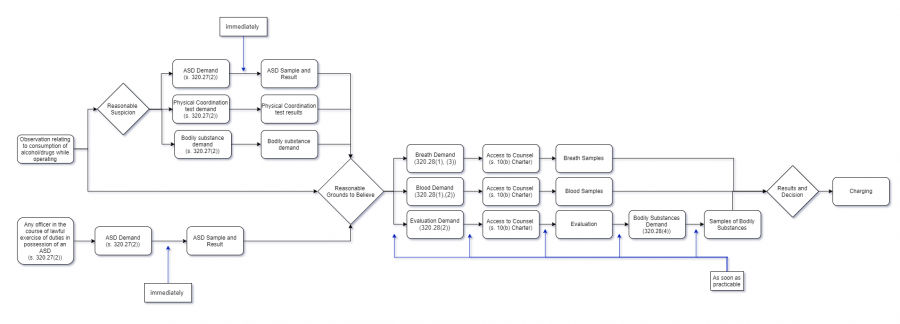Conveyance Offences
Introduction
On December 18, 2018, Part VIII.1 entitled "Offences Relating to Conveyances" was added to the Code.
Statement of Principles
- Recognition and declaration
320.12 It is recognized and declared that
- (a) operating a conveyance is a privilege that is subject to certain limits in the interests of public safety that include licensing, the observance of rules and sobriety;
- (b) the protection of society is well served by deterring persons from operating conveyances dangerously or while their ability to operate them is impaired by alcohol or a drug, because that conduct poses a threat to the life, health and safety of Canadians;
- (c) the analysis of a sample of a person’s breath by means of an approved instrument produces reliable and accurate readings of blood alcohol concentration; and
- (d) an evaluation conducted by an evaluating officer is a reliable method of determining whether a person’s ability to operate a conveyance is impaired by a drug or by a combination of alcohol and a drug.
2018, c. 21, s. 15
Offences
- Dangerous Operation of a Motor Vehicle (Offence)
- Flight from a Peace Officer (Offence)
- Failure to Stop or Remain at Scene of Accident (Offence)
- Operation While Impaired by Alcohol or Drug (Offence)
- Refusal (Offence)
- Driving While Disqualified (Offence)
Procedure

- Arrest and Detention
- Screening for Drugs or Alcohol
- Right to Counsel
- Proof of Impairment by Drugs or Alcohol
- Admission of Breath or Blood Sample
- Blood Sample Warrants in Impaired Driving Investigations
- Disclosure of Calibration Records of Screen Devices and Approved Instruments
- Prior to December 2018
- Screening Device (Until December 13, 2018)
- Breath Sample Demand (Until December 13, 2018)
- Blood Sample Seizure in Impaired Driving Investigations (Until December 13, 2018)
- Proof of Blood Alcohol Levels (Until December 13, 2018)
- Operation, Care or Control of a Vehicle (Until December 13, 2018)
- Refusal to Give a Sample (Until December 13, 2018)
Definitions
Under Part VIII.1 under "Offences Relating to Conveyances", the following definitions apply:
- Interpretation
- Definitions
320.11 The following definitions apply in this Part [Pt. VIII – Offences Against the Person and Reputation (ss. 214 to 320.1)].
"analyst" means a person who is, or a person who is a member of a class of persons that is, designated by the Attorney General under subparagraph 320.4(b)(ii) [AG Canada power to designate person to analyze samples] or paragraph 320.4(c) [AG Canada power to designate persons to certify alcohol standards]. (analyste)
"approved container" means a container that is designed to receive a sample of a person’s blood for analysis and that is approved by the Attorney General of Canada under paragraph 320.39(d) [AG Canada power to approve container to receive blood]. (contenant approuvé)
"approved drug screening equipment" means equipment that is designed to ascertain the presence of a drug in a person’s body and that is approved by the Attorney General of Canada under paragraph 320.39(b) [AG Canada power to approve equipment to ascertain drug in body]. (matériel de détection des drogues approuvé)
"approved instrument" means an instrument that is designed to receive and make an analysis of a sample of a person’s breath to determine their blood alcohol concentration and that is approved by the Attorney General of Canada under paragraph 320.39(c) [AG Canada power to approve instrument to analyse breath to determine BAC]. (éthylomètre approuvé)
"approved screening device" means a device that is designed to ascertain the presence of alcohol in a person’s blood and that is approved by the Attorney General of Canada under paragraph 320.39(a) [AG Canada power to approve device to ascertain blood alcohol]. (appareil de détection approuvé)
"conveyance" means a motor vehicle, a vessel, an aircraft or railway equipment. (moyen de transport)
"evaluating officer" means a peace officer who has the qualifications prescribed by regulation that are required in order to act as an evaluating officer. (agent évaluateur)
"operate" means
- (a) in respect of a motor vehicle, to drive it or to have care or control of it;
- (b) in respect of a vessel or aircraft, to navigate it, to assist in its navigation or to have care or control of it; and
- (c) in respect of railway equipment, to participate in the direct control of its motion, or to have care or control of it as a member of the equipment’s crew, as a person who acts in lieu of a member of the equipment’s crew by remote control, or otherwise. (conduire)
"qualified medical practitioner" means a person who is qualified under provincial law to practise medicine. (médecin qualifié)
"qualified technician" means
- (a) in respect of breath samples, a person who is designated by the Attorney General under paragraph 320.4(a) [AG Canada power to designate person to operate appr. instrument]; and
- (b) in respect of blood samples, a person who is, or a person who is a member of a class of persons that is, designated by the Attorney General under subparagraph 320.4(b)(i) [AG Canada power to designate person to take blood samples]. (technicien qualifié)
"vessel" includes a hovercraft. (bateau) 2018, c. 21, s. 15.
[annotation(s) added]
